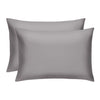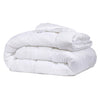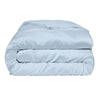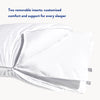The Daily Miracle
How Long Can You Go Without Sleep?
Published
January 19, 2023
Author
Bridget Reed

It’s no secret that sleep plays a vital role in your overall health, and while six to eight hours is a healthy amount of sleep, people have gone much longer without sleep. The amount of sleep each person needs can vary since it largely depends on age.
The longest someone has gone without sleep was 11 days (or 264 hours). Randy Gardner intentionally set this world record, and we mean it when we say you shouldn’t try this at home.
It’s unclear how long a human can survive without any sleep, but sleep deprivation can be seriously harmful to your health. Symptoms can show as early as a few days of poor sleep, and both the long-term and short-term effects are drastic.
Why Is a Consistent Sleep Schedule So Important?
While we’ve all pulled an occasional all-nighter, those habits aren’t sustainable for overall health and wellness. A full night of sleep should be a top priority, which means you may want to reconsider any late-night plans.
A lack of sleep can cause grogginess and irritability, as well as issues with your mental health. As your total sleep deprivationprogresses, you may even notice some serious psychological side effects.
If you aren’t getting enough sleep, the consequences of the deficit can be dire. Your brain is a hard-working organ that constantly adapts and learns new things. However, it also receives a lot of input over the course of a normal day.
Sleep is about so much more than just waking up the next day feeling rested. It’s the time your brain sets aside in order to process the events of the day, refresh itself, store memories, and even create hormones.
A lack of sleep can also affect the brain's ability to form or maintain the pathways it needs to grow and develop. High-quality sleep can even help your neuron cells communicate more efficiently. Basically, your brain works even while you’re sleeping, fine-tuning everything for when you’re awake.
Getting consistent sleep can help reinforce your brain’s sleep-wake cycle, which can help prevent feelings of tiredness throughout the day, as well as help you feel more tired when it’s time to go to bed.
What Causes a Lack of Sleep?
Unfortunately, it’s pretty common to experience poor sleep or lack of sleep. Before we get into the nitty-gritty, let’s first discuss what causes poor sleep, chronic sleep deprivation, and other sleep disorders.
Stress
Stress is a common cause of poor sleep. Thinking about work, school, family, or other potential stressors can leave your mind racing, causing an inability to fall asleep.
To avoid this side effect of stress, try your best to relax and get your heart rate a bit lower. Activities like going on a long walk before bed or taking a warm bath or shower can help with this. Relaxation looks different to everyone, but knowing what works best for you is crucial — and you should try to make time to relax daily.
Your Schedule
If you’ve been traveling or your work schedule is demanding, that can affect your sleep quality when you finally get to snooze.
While it can be difficult to fix your work or travel schedule, you can make small changes to make the most of your time off. Try your best to get sleep whenever it makes sense, even if it's a short power nap or microsleep.
Alcohol Consumption
While some people may think that drinking before bed improves sleep, it’s actually the opposite. Alcohol consumption can affect your body's ability to get into REM sleep, which causes your sleep quality to decline.
Poor Eating Habits
Eating highly processed foods near your preferred bedtime can also prevent a good night's sleep. Late-night snacking is okay in moderation.
The real issues arise when you’re over-eating close to bedtime since eating before bed kick-starts your metabolism. Once your metabolism is up and working, it may be difficult to fall asleep.
Lack of Exercise
Exercise is one of the best ways to improve your eating habits, sleeping habits, productivity levels, and stress levels, as well as enhance your overall quality of life. Implementing a workout regimen may be a good idea if you find yourself pacing back and forth (or scrolling) most of the night.
Sleep apnea
Sleep apnea is a sleep disorder where your body stops breathing momentarily during sleep. The constant stopping and starting of your breathing can prevent you from entering into a deep REM sleep, which can be detrimental to your health.
People that suffer from sleep apnea often use a breathing machine to ensure their health and safety.
What Are the Effects of Sleep Deprivation?
Lack of sleep shouldn’t be taken lightly, and if you’ve noticed a drastic decrease in your sleep time or any of these symptoms, it may be time to contact your doctor for medical advice.
Higher Risk of Anxiety
Anxiety is a common side effect of any lack of sleep. If you’ve had poor sleep for a few days in a row, it’s not uncommon to feel anxious for seemingly no reason.
Lack of sleep can cause your cortisol levels to spike, leading to this phenomenon. As the effects of anxiety continue, they can even impact your everyday life and activities.
Fogginess
There’s no better feeling than a good night's rest that leaves you feeling sharp and ready to tackle the day. On the other hand, a poor night's sleep can make you feel foggy and unalert. It can even cause you to make errors in the workplace and at home.
Poor sleep can affect how your brain communicates with your body. For example, a lack of sleep can affect how your brain responds to stimuli. This can lead to impaired hand-eye coordination, reaction time, and decision-making abilities.
Poor Memory
A lack of sleep can affect your brain's ability to create and form new memories. This can then lead to periods of forgetfulness, brain fog, and difficulty remembering past experiences.
Poor Concentration
If you’ve been getting insufficient sleep and have noticed a decrease in sharpness and ability to concentrate, chances are you’re suffering from sleep-related cognitive impairment. When your brain and body don’t get enough rest, they aren’t able to perform optimally.
This can cause issues in concentration, as well as your ability to process new information.
Weight Fluctuations
Lack of sleep can also cause weight gain or weight loss, as well as affect your appetite. However, weight fluctuations can also be a sign of more serious medical issues, so it’s important to consult a medical provider about any weight gain or loss.
Sleep deprivation can also weaken your immune system and quickly deteriorate your overall health.
How To Get The Best Night's Sleep
Now that you see how important it is to get the proper amount of shut-eye, let's talk about getting better sleep.
It’s All About Your Bedding
One way to encourage a good night's sleep is comfort. Laying down should feel like you’ve landed on a cloud of pure bliss.
You can’t achieve optimal comfort without the perfect bedding, and when you find it, you’ll know! However, if you’re unfamiliar with the bedding department and aren’t sure what makes the perfect set of sheets, we’ve got you covered.
Keep a Sleep Schedule
Whenever possible, try to go to sleep and wake up at the same time every day. Your brain functions best when it has a routine, and following a sleep schedule can help your brain deliver important sleep cues when it’s time to go to bed.
Follow a Bedtime Routine
Following a bedtime routine is one of the most important things you can do for your sleep hygiene. Whether your routine involves skincare, a bath, a good book, or dedicated time away from your screens, find what works for you and stick with it.
Check Your Thermostat
The temperature of your room plays a crucial part in how well you sleep. If your room isn’t the right temp, it can cause serious discomfort.
Your body temperature naturally rises when you sleep, which is why most people prefer their rooms to be a bit cooler. The optimal temperature for sleeping is 60 to 67 degrees.
Rest Assured; Good Sleep Is on the Way
Suffering from any sleep condition can be exhausting (literally).
While some conditions require medical assistance, sometimes the fix is as simple as a new set of sheets. Of course, if you’re experiencing any symptoms related to lack of sleep, you should contact your doctor. If you’re simply struggling to get comfy, though, Miracle Brand may be your ticket to blissful rest.
Sources:
The Best Temperature for Sleep: Advice & Tips | Sleep Foundation
What Is Sleep Apnea? | NHLBI, NIH
Brain Basics: Understanding Sleep | National Institute of Neurological Disorders and Stroke
Sleep and Sleep Disorders | Centers for Disease Control and Prevention (CDC)


























